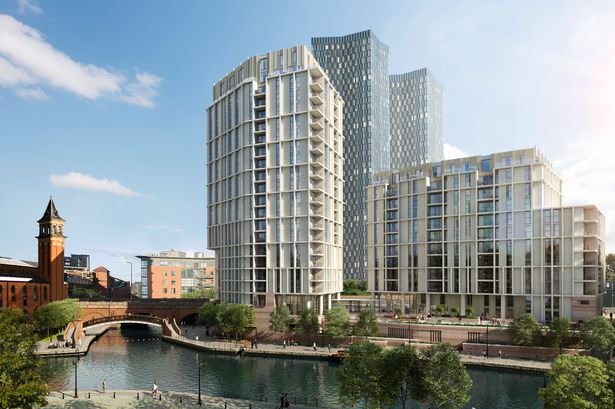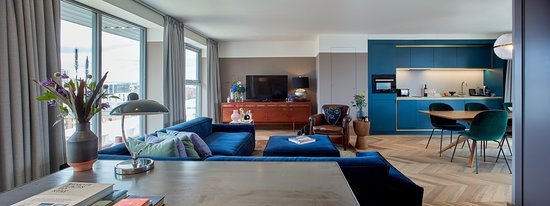Off-plan property. Is it for me?

Off-plan property has its advantages. There’s a lot of upside of buying property in the construction phase. However, it is not without risk. We take a look at the pros and cons of this type of property.
What is off-plan property?
Off-plan property means purchasing a house or a flat while it’s still under construction. Within this area, there is a wide range of scenarios. It could mean buying the property while it is still in its design and planning phase. Alternatively, you could be looking at a near-completed project, with only the final touches such as carpets and fittings to add.
The risks and returns can vary depending on how far the project is from completion. Typically the largest discounts are at the design and planning stage.
What are the advantages of buying an off-plan property?
There are several advantages to buying off-plan property. The biggest advantage is you can secure a discounted rate and this allows you to generate wealth. You can also benefit from new build warranties as well as potentially having a say in the fixtures and fittings.
1. Off-plan property is sold at a discounted rate
A developer is often willing to accept a lower offer in return for a guaranteed buyer at the end of the project. This helps the developer, as it gives them confidence that they can pay back any finance that they’ve taken out on time. This prevents late payment charges from the bank or finance house.
As a result, the earlier you commit to buying off-plan, the bigger the discount you’re likely to obtain. With some developers, this saving can be very attractive. As an investor, securing a discount can help you in several ways.
Lower mortgage
If you’re looking to let your property out, a lower purchasing price will result in a lower mortgage, which will increase your bottom line. You also can buy several units from the developer. This has additional advantages, in that you could secure an even bigger discount, along with the advantage of having your investments in one place. This adds to the convenience, especially if you’re involved in the day-to-day management side.
Self-financing portfolio
Securing a discount means that when the property completes you’ll have a lot of equity in the property. This means you can re-mortgage at a later stage and take out your equity and put it towards the deposit of an additional property. This has been a tried and tested strategy for several property investors, who have used this model to generate a self-financing portfolio. So, if you’re an experienced investor interested in buying off-plan, you’ll usually want to buy the property as early as possible when the discounts are higher so you can maximise your investment return.
Better flipping options
If you are planning on flipping the property (selling on completion), then putting your deposit down a couple of years in advance will give you the benefits of growth in the market, over and above your initial discount. Manchester, for example, has seen property prices go up by an average of 15% in the last two years. A flipping strategy can give investors the benefit of realising profit without the hassle of sourcing a tenant and dealing with any upkeep issues.
2. You can choose your own fittings
Another benefit of buying off-plan is that you often get the opportunity to influence the look and feel inside the property, by choosing your fixtures, fittings and finishes. As a landlord, you would typically want more neutral designs to make your property attractive to a wider range of tenants. You can check out some pro tips on how to furnish your property here. You should select finishes which are easy to maintain. This will save you money in the longer term as there is less work to be done between a change of tenants.
Perhaps more attractively, there is less work needed compared to buying an existing property, saving you time in the process. If you decide to invest in a furniture pack for your investment property, then it will create a boutique feel. This is a great strategy for maximising your investment yield.
3. Protection for when things go wrong
Buying an off-plan should give you some added protection compared to purchasing an older property. At least you know the boiler will work, the roof is new and the property complies with all regulatory requirements. This means your property is ready to be leased out.
More importantly, you’ll have a new build warranty which covers you for any potential problems, saving you money and giving you peace of mind.
Your warranty is split into two periods. During the first two years after completion, any issues with the property (such as leaky windows or ill-fitting doors), your builder is obliged to come and make repairs to their original work. Furthermore, Esper Wealth has set up a specialist Aftercare division which will act as your point of contact for the first 12 months after completion. Aftercare is our commitment to you. Our team will be on hand to deal with any issues you have with your new property.
During the second, structural warranty period, the builder is only responsible for major problems with the property. This second warranty period lasts for an additional eight years, giving you ten years of protection in total.
If you’re selling the property once it’s completed, this protection is a great selling point, as your warranty is transferred to the new buyer.

What are the disadvantages of buying an off-plan property?
Like all investments, buying property off-plan has its risks. Below we have enclosed the risks and inconveniences of investing in this type of property.
1. The property market is not guaranteed
Whilst the UK property market has done exceptionally well for over a decade, you can never be entirely sure that the market will continue to rise. Should there be a fall in the property market you are still committed to buying.
2. The development could be delayed or have issues
Another risk you need to consider is that the project could take longer than anticipated. This is very common and is only normal due to the complexities of construction. With this in mind, it is prudent to wait until close to completion before searching for a tenant. There is also a risk that the development may fail. So it is important that when investing in off-plan developments you do your due diligence.
As an investment company, we have a stringent vetting process for all developers we work with. All the same, we have composed a list of important questions to ask when buying property off-plan. This will help you assess the risk before committing to buy.
3. You might be denied a mortgage
There is a risk for investors that you might not get a mortgage. Your circumstances may change between purchase and completion, or the market could change, meaning that lenders will lend to a different set of criteria. Therefore, even if you obtained a decision in principle, this doesn’t guarantee you’ll receive the same offer when the development comes to completion. This is an important point to consider as in the exchange of contracts you are legally obligated to go through with the purchase. Because of this, it is wise to make sure you borrow prudently to avoid these concerns.
However, if your circumstances do change for the worse, there are several specialist lenders who can help. At Esper Wealth we can put you in front of an independent mortgage specialist before reservation. This is designed to help you understand any mortgage contingencies.

Should I invest in an off-plan property?
This depends on you. If you are cautious by nature and looking more towards income then there are potentially better options. Yet if you are prepared to take calculated risks to build up growth then investing in off-plan properties could be a great way for you to achieve your financial goals.
Investment goals
As an investor, you should always be clear on your financial objectives and your attitude to risk. You need to ask yourself, am I investing for income, growth or a combination of the two? Am I planning on using mortgage finance to fund the purchase? And if so, am I sure to get finance on the right terms?
Consultative approach
At Esper Wealth we take a consultative approach to property investment. As part of our service, we will offer a free investment review.
From this review, we will gain an understanding of your current financial situation and attitude to risk. We will also get a clear picture of your future goals. This will help us to find the solution that is best for you.
Property Experts
When dealing with Esper Wealth you will receive outstanding advice, tailor-made to your specific needs. Your investment consultant will be on hand to help you understand the tax implications of stamp duty and mortgage interest tax relief. If you prefer you can read buy-to-let mortgages and the key details explained. This covers key issues for financing investment property.
It may be that you are thinking of buying an investment property via a limited company. If you are a higher taxpayer, then we suggest reading the advantages of buying property through a limited company. You can also visit the conveyancing section of our website where you will find a lot of interesting information to guide you in the right direction.
Most importantly, our experts can help to find investment property in the best locations, at a great price. This insider knowledge will help you unlock real value from UK property.
The Esper way
At Esper Wealth we work for you. Our role is to listen to you and guide you to achieve your goals. As a client we want you to feel comfortable in the investment process, in the belief that we are delivering the best advice. With this in mind, it is important to follow three simple rules when investing:
- Never feel pressured. Many property sales companies work on urgency. This is the wrong approach. You should take the time to decide what is right for you and your family. If this means you miss a particular property then be rest assured another opportunity will arise.
- Be transactional. This means trying not to be emotive about a property. Remember you are not living in it. Ask yourself, do the numbers work financially for me?
- Ask yourself, what if? In life, we never know what’s around the corner. Sometimes your circumstances can change. If things do change, how will it impact me? Whilst you can never legislate for all contingencies, it is advisable to invest with your eyes open.
If you are interested in off-plan opportunities, or completed property direct from the developer, then visit our developments page. Alternatively, if you would prefer to start your investment journey by having a no obligations free investment review, then contact a member of our team who will be happy to help.